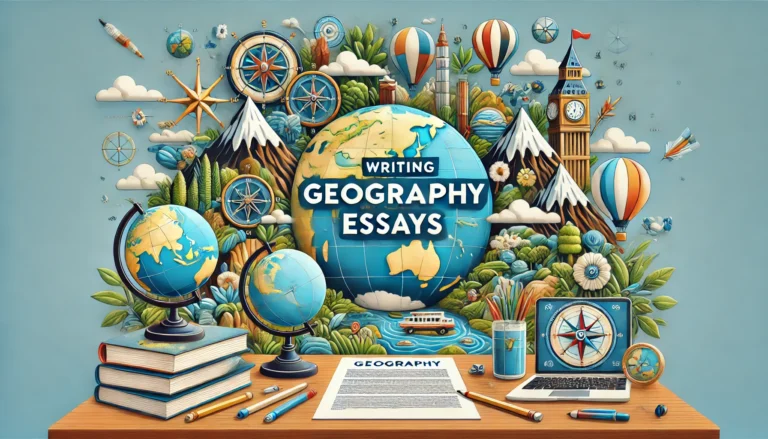Essay Writing Guides
Geography Essay: Tips and Examples


Imagine standing at the edge of the Grand Canyon, marveling at the immense layers of rock that tell the story of Earth’s history. Just as these geological formations reveal the secrets of our planet, writing a geography essay can uncover the intricate details of the world around us.
In this journey, we’ll explore the art of crafting a compelling geography essay. We’ll begin by understanding what defines a geography essay then delve into the techniques and strategies that can help you write an exceptional one. Along the way, we’ll share helpful tips, outline the essential components, and discuss the significance of geography in our daily lives. Whether you’re a student aiming for excellence in your geography course or simply curious about the world, this guide is tailored for you. Let’s embark on this adventure together!
What is a Geography Essay
A geography essay is an academic piece of writing that explores topics related to the Earth’s landscapes, environments, and the relationships between people and their surroundings. It involves analyzing geographical data, examining spatial patterns, and discussing the impact of human activities on natural systems. The goal is to understand better how geography’s physical and cultural aspects interact and shape our world. Through clear argumentation and evidence-based analysis, a geography essay provides insights into the complexities of our planet’s geography.
Ready to Turn Your Passion for Places into an Epic Essay?
Geography geek or not, we’ve got your back. Let us craft your custom essay that’s as intriguing as it is insightful!
Essential Factors When Writing a Geography Essay
Several essential factors must be considered when writing a geography essay to produce a well-rounded and compelling essay.
- Understanding the Topic: Start by ensuring you clearly grasp the essay prompt or question. Geography is a broad field, encompassing topics from physical features like mountains and rivers to human activities such as urban development and climate change. Knowing the specific focus of your essay is critical to staying on track.
- Thorough Research: Conduct comprehensive research to gather accurate and relevant data. This may include academic journals, books, reports, and reliable online sources. The quality of your research will directly impact the depth of your analysis and the strength of your arguments.
- Logical Structure: Organize your essay with a clear structure. Begin with an introduction that outlines the essay’s purpose and key points. Follow with well-organized body paragraphs, each covering a specific aspect of the topic, and conclude with a summary that ties everything together.
- Use of Geographical Terminology and Visuals: Incorporate appropriate geographical terms to demonstrate your understanding of the subject. Using maps, diagrams, or charts can enhance your essay by providing visual context and supporting your arguments.
- Proper Referencing: Always cite your sources accurately to avoid plagiarism and to lend credibility to your work. Use a consistent citation style, such as APA or MLA, as required by your instructor or publication.
How to Start a Geography Essay
Starting a geography essay requires a clear approach that sets the tone for the rest of the paper. The introduction should grab the reader’s attention while providing a brief topic overview. Let’s explore how to begin your geography essay effectively:
- Introduce the Topic: Start with a compelling statement or question highlighting the significance of the geographical issue or subject you’ll discuss. This could be an interesting fact, a relevant statistic, or a thought-provoking question that engages the reader.
- Provide Context: Briefly explain the broader context of the topic. This might include a background on the geographical area, the environmental issue, or the human activities influencing the landscape. Providing context helps the reader understand the importance of the topic.
- State Your Thesis: Clearly state your thesis or the central argument of your essay. This statement should guide the direction of your essay, letting the reader know what to expect in terms of analysis and discussion.
- Outline the Structure: Give a brief outline of the main points you will cover in the essay. It provides a roadmap for the reader and ensures your essay has a logical flow from the introduction to the conclusion.
How to Write a Geography Essay
Writing a geography essay involves a systematic approach that ensures your argument is clear, well-supported, and engaging. By following a few key steps, you can effectively present your analysis of geographical topics. Our essay writers are here to give you some handy tips:
- Choose a Relevant Topic
Select a topic that is interesting and relevant to the course or current geographical discussions. Ensure the topic is narrow enough to be thoroughly explored within the scope of your essay.
- Conduct Thorough Research
Gather data from credible sources such as academic journals, books, and reputable websites. Look for geographical studies, maps, and statistics to support your arguments and provide evidence for your analysis.
- Create an Outline
Plan the structure of your essay with a clear outline. Divide your essay into sections: introduction, body paragraphs, and conclusion. This will help you organize your thoughts and ensure that each part of the essay contributes to your overall argument.
- Write the Essay
Start with an engaging introduction that presents your thesis statement. Develop each body paragraph with a clear point supported by evidence, and use geographical terminology and visuals where appropriate. End with a conclusion that summarizes your key findings and reinforces your thesis.
- Revise and Edit
Review your essay for clarity, coherence, and accuracy. Ensure all sources are correctly cited and your argument is consistent throughout. Editing for grammar, punctuation, and style will also ensure your essay is polished and professional.
Geography Essay Topics
Geography is a diverse and fascinating field that covers everything from physical landscapes to human interactions with the environment. Whether you’re exploring natural phenomena or the impact of urbanization, these essay topics offer a wide range of possibilities for your writing. Here are 30 geography essay topics to inspire your next assignment:
- The impact of climate change on coastal regions.
- Deforestation in the Amazon Rainforest and its global implications.
- The role of geography in shaping cultural identities.
- Urbanization and its effects on local ecosystems.
- The influence of plate tectonics on natural disasters.
- Water scarcity and its geopolitical consequences.
- The geographical factors contributing to biodiversity hotspots.
- The impact of tourism on fragile ecosystems.
- Geographic challenges of sustainable agriculture in arid regions.
- The role of rivers in the development of ancient civilizations.
- The geographical distribution of natural resources and global conflicts.
- The effects of desertification on communities in Sub-Saharan Africa.
- Climate migration: How geography influences population movement.
- The role of geography in the spread of infectious diseases.
- The impact of glacial melting on global sea levels.
- Geographic factors influencing economic development in Southeast Asia.
- The relationship between geography and political boundaries.
- The effects of industrialization on air quality in urban areas.
- The role of the Himalayas in shaping regional climates.
- Geographic challenges of disaster management in earthquake-prone regions.
- The impact of geography on food security in developing countries.
- The influence of monsoon patterns on agriculture in South Asia.
- The role of geography in the distribution of renewable energy resources.
- The effects of urban sprawl on transportation systems.
- Geographic factors contributing to the spread of wildfires.
- The impact of rising sea levels on island nations.
- The role of geography in the global distribution of poverty.
- Geographic influences on the development of trade routes in history.
- The effects of human activity on the world’s oceans.
- The role of geography in the preservation of cultural heritage sites.
Geography Essay Example
7 Bonus Tips for Writing a Geography Essay
Below are 7 bonus tips from our paper writing service experts, who are on standby to give you some handy tips:
🌍 Bonus Tip | 🌟 Description |
🗺️ Use Geographical Terminology | Incorporate specific geographical terms and concepts relevant to your topic to add depth to your analysis. |
🧭 Incorporate Visuals | Include maps, charts, and diagrams to support your arguments and illustrate complex geographical data. |
🌐 Focus on Spatial Relationships | Highlight how different geographical factors interact and influence each other throughout your essay. |
🏞️ Analyze Case Studies | Use real-world examples or case studies to provide concrete evidence and show the practical implications. |
📰 Keep Up with Current Events | Integrate recent developments or data to make your essay more relevant and timely. |
⚖️ Balance Descriptive and Analytical Writing | Ensure your essay explains the ‘why’ and ‘how’ behind the facts, not just describing geographical features. |
🌏 Revise with a Global Perspective | Consider different scales, from local to global, and address the broader implications of your topic. |
Why Geography Matters as a Subject of Study
Geography is more than just the study of maps and landscapes; it’s a discipline that connects people, places, and environments. Understanding geography helps us make sense of the world around us and how we interact with it. Here are several reasons why geography is an essential subject of study:
- Understanding the Earth’s Processes: Geography provides insights into natural processes like climate, weather patterns, and tectonic movements, helping us understand the forces that shape our planet.
- Exploring Human-Environment Interactions: It examines how humans interact with their environment, including the impact of human activities on natural resources and ecosystems.
- Promoting Global Awareness: Geography fosters a global perspective, helping us understand different cultures, economies, and political systems worldwide.
- Supporting Sustainable Development: Knowledge of geography is crucial in addressing environmental challenges and promoting sustainable practices that protect the planet.
- Improving Spatial Awareness: Studying geography enhances our ability to think spatially, which is valuable in urban planning, logistics, and environmental management.
- Guiding Policy and Decision-Making: Geographical knowledge is essential for making informed decisions on resource management, disaster response, and urban development.
- Encouraging Critical Thinking: Geography teaches critical thinking by requiring students to analyze and interpret data, recognize patterns, and consider multiple perspectives.
- Connecting History and Science: It bridges the gap between the physical and social sciences, linking historical events to geographical factors and scientific principles.
- Enabling Informed Citizenship: A solid understanding of geography equips individuals to engage in discussions about global issues, such as climate change and migration, as informed citizens.
- Preparing for Diverse Careers: Geography offers versatile skills applicable to various careers, including environmental science, education, government, and business.

Ready to Explore the World without Leaving Your Desk?
Let our expert writers be your guides on this geographical journey and map out your academic success together!
Recap
In this article, we’ve explored the significance of geography as a subject and the essential elements involved in writing a compelling geography essay. From understanding the key themes of geography to crafting well-structured essays, the tips and insights provided are designed to help you excel in this field. Whether you’re examining the impact of climate change, analyzing human-environment interactions, or exploring spatial relationships, geography offers a fascinating lens through which to view the world. Applying the strategies discussed will enable you to tackle any geography essay confidently.
FAQs
What is geography in simple words essay?
Geography, in simple terms, is the study of the Earth, its features, and the relationship between people and their environment. In an essay, geography can be explained as the exploration of physical landscapes, climates, ecosystems, and human activities and how these elements interact and influence each other across different world regions.
What are the 5 themes of geography essay questions?
The 5 themes of geography provide a framework for studying and understanding the world. They include:
- Location: Where is it? Questions might explore the absolute or relative location of a place.
- Place: What is it like there? Questions could examine the physical and human characteristics that make a location unique.
- Human-Environment Interaction: How do people interact with their environment? Questions might focus on how humans adapt to, modify, or depend on their surroundings.
- Movement: How do people, goods, and ideas move from one place to another? Essay questions could address patterns of migration, trade, or communication.
- Region: How are areas grouped? Questions might explore how physical, cultural, or political criteria define regions.
Source
The University of Adelaide. Geography Essay Writing Guidelines.

